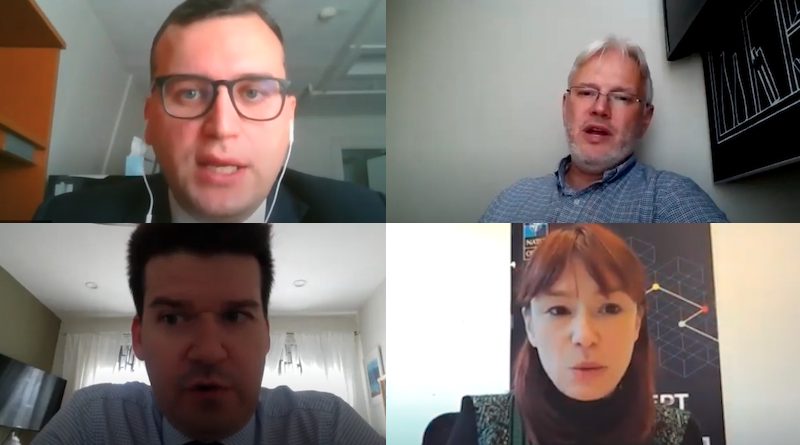The Future of European Security: New Challenges and Opportunities
By Alex Thomas, MALD 2023 Candidate, The Fletcher School of Law and Diplomacy
With Russia’s invasion of Ukraine in February, the European security framework as we know it has been forever altered. Western countries and NATO have provided a non-NATO member, Ukraine, with an unprecedented amount of military and humanitarian aid. Sweden and Finland, two countries which were non-aligned in the Cold War, have now applied for NATO membership. To top everything off, Putin’s rash nuclear saber-rattling has come to dominate mainstream news headlines.
To make sense of the challenges and opportunities of this new age of European security, the Russia and Eurasia Program and Center for Strategic Studies at The Fletcher School co-hosted a virtual panel with four experts from various fields. The first was Volodymyr Dubovik, associate professor in the department of International Relations and director of the Center for International Studies at Odesa I. I. Mechnikov National University in Ukraine. The second was Yury Nadtochey, associate professor in the department of World Politics at MGIMO University in Moscow. The third was Benedetta Berti, Fletcher Ph.D. graduate and head of Policy Planning at the Office of the Secretary General at NATO. The panel was moderated by Pavel Luzin, former senior lecturer at the Higher School of Economics in Perm and previous consultant on armed forces for former Russian presidential candidate Alexei Navalny. Dubovik, Nadtochey, and Luzin are all visiting scholars at the Fletcher School.
After introductions by Arik Burakovsky, the assistant director of the Russia and Eurasia Program, Benedetta Berti spoke about NATO’s evolution regarding the security environment and how NATO’s current actions play into its strategic concept from this past summer.
“If one compared the 2010 strategic concept to its 2022 counterpart, you would have a very good understanding of how we have changed the way we approach the European security environment. In [the 2010 concept], it talked about the NATO-Atlantic area being at peace and the risk of conventional conflict involving allies being low. It even talked about the aspiration to continue building a strategic partnership with Russia. The 2022 concept starts by saying we are no longer at peace and the possibility of a conventional attack can no longer be discounted,” Berti began.
“This new post-Cold War period is marked by increasing instability and fragility in our neighborhood… It’s a period where authoritarian powers are deliberately pushing back against the rules-based international order.”
After Berti’s concluding remarks about NATO’s strategic shift towards preparing for competition in Europe, Pavel Luzin introduced Volodymyr Dubovik, a leading Ukrainian expert on security in the Black Sea region.
“Ironically, I think Ukraine is going to come out much stronger from this conflict than people think, because of the major consolidation happening here in Ukraine. The political nation that [Ukraine] had prior to February 2022 is now much stronger and the people are more united than ever,” Dubovyk began.
“Among these security issues in Europe, what can now be said about bringing an end to the fighting between Russia and Ukraine? I think of course it requires the liberation of the Ukrainian lands. But in our discussions with our Western allies, what that means remains unclear. Are we trying to go back to the 1991 borders? Pre-2014 annexation of Crimea? Or pre-February 2022? The Ukrainian offenses have been successful, even though they’ve been costing us a lot and our economy is suffering greatly. Yet through all of this, there has been no appetite for ending the war prematurely to Russia’s conditions.”
Visiting scholar Yury Nadtochey then spoke about the construction of the European security architecture following the dissolution of the Soviet Union and before Russia’s 2022 invasion of Ukraine, saying, “It would not be a great exaggeration to say that after the collapse of the Berlin Wall and dissolution of the Warsaw Pact, there was a great opportunity to build a Europe that was whole and free. Europe was in an unprecedented peaceful condition during this time.”
“Russia sees itself now as fighting a war not only against Ukraine, but against a united and unified West. But whether this is branded as a new kind of global conflict or world war, I am not fully sure about this,” Nadtochey said.
After each panelist gave opening remarks, moderator Pavel Luzin went through several questions with each panelist pertaining to Western solidarity, military support for Ukraine and the end of the war, and NATO’s evolving strategy within the context of China.
On the question of NATO’s perception of China, Berti spoke about how there is little evidence that NATO perceived China as a threat until NATO’s 2022 strategic concept, yet NATO is now clear that China’s stated policies and objectives are “a challenge to our security and values.”
Professor Dubovyk succinctly characterized the uncertainty about how the war in Ukraine could end,saying, “No one here in Ukraine is naïve about the extent to which it will be easy for us to win the war. But our hope is high. Our morale is high. And the Ukrainians are not so willing to give up.”
Before the question and answer session with attendees, Nadtochey spoke on the difficulties of returning to any kind of arms control agreements between the West and Russia and how arms control will remain a difficult ideal to strive towards long after the war ends.


Pingback: nft news
Pingback: www.dash-cam.biz